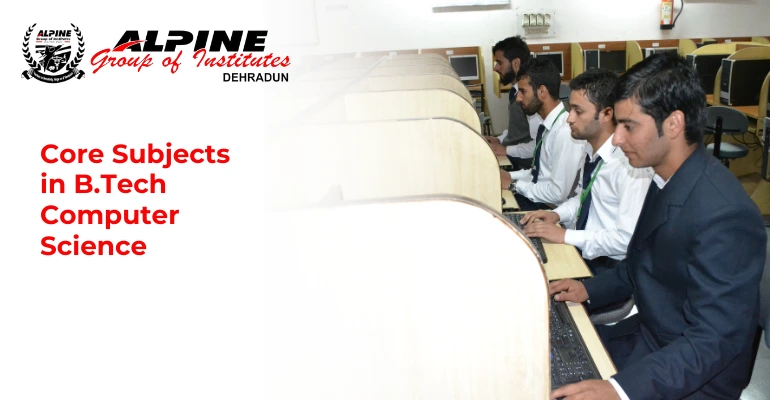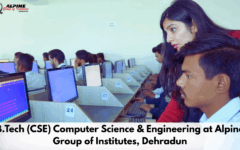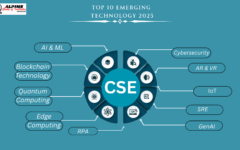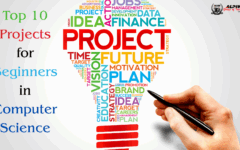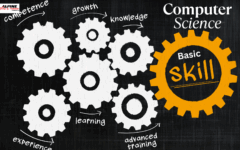Core Subjects in B. Tech Computer Science
2024-12-17 6:41Core Subjects in B. Tech Computer Science
A B. Tech in Computer Science provides students with a comprehensive understanding of the theoretical and practical aspects of computing. The curriculum is designed to give students the necessary skills to design, develop, and manage technology solutions across various domains. The subjects covered during the course range from foundational mathematics and programming to advanced topics like artificial intelligence and cybersecurity.
Here’s an overview of the core subjects typically covered in a B.Tech in Computer Science program:
1. Mathematics for Computer Science
Mathematics plays a crucial role in computer science, providing the foundation for problem-solving and algorithm design. Key areas include:
- Discrete Mathematics: Focuses on topics like set theory, combinatorics, logic, graphs, and relations, which are fundamental to algorithms and data structures.
- Linear Algebra: Deals with vectors, matrices, and their applications, important for computer graphics, machine learning, and data analysis.
- Probability and Statistics: Essential for data science, machine learning, and handling uncertainty in algorithms.
- Calculus: Basics of differentiation and integration, applied in fields such as computer graphics and machine learning.
2. Programming Languages
One of the primary goals of a B.Tech in Computer Science is to make students proficient in multiple programming languages. These languages serve as tools for implementing algorithms, developing software, and building systems. Common programming languages taught include:
- C and C++: Foundational programming languages used for system-level programming, data structures, and algorithm implementation.
- Java: A versatile, object-oriented language widely used in software development and enterprise applications.
- Python: Known for its simplicity and used extensively in areas like data science, machine learning, and web development.
- JavaScript: Used for building interactive web applications and front-end development.
3. Data Structures and Algorithms
Data structures and algorithms are at the core of computer science, enabling efficient data management and problem-solving. This subject includes:
- Data Structures: Study of various structures such as arrays, stacks, queues, linked lists, trees, graphs, and hash tables.
- Algorithms: Techniques for solving problems efficiently, including sorting (e.g., quicksort, mergesort), searching (e.g., binary search), and graph algorithms (e.g., Dijkstra’s algorithm).
- Algorithm Design: Covers concepts like divide and conquer, dynamic programming, greedy algorithms, and backtracking.
- Complexity Analysis: Big-O notation and evaluating the time and space complexity of algorithms.
4. Computer Organization and Architecture
This subject introduces students to the internal workings of computers. Topics include:
- Basic Computer Organization: CPU, memory, I/O devices, and how they interact.
- Instruction Set Architecture (ISA): Understanding how software interacts with hardware.
- Memory Hierarchy: Study of registers, cache, RAM, and disk storage.
- Assembly Language: Low-level programming that provides a closer view of how hardware processes data.
5. Operating Systems
Operating systems (OS) manage hardware resources and provide services to software applications. Key topics include:
- Process Management: Scheduling, synchronization, and inter-process communication.
- Memory Management: Allocation and deallocation of memory, paging, segmentation, and virtual memory.
- File Systems: Structure, access methods, and file management techniques.
- System Security: Protecting system resources from unauthorized access and ensuring integrity.
6. Database Management Systems (DBMS)
DBMS is essential for storing, retrieving, and managing large amounts of data. Topics covered include:
- Relational Databases: SQL, database normalization, and relational data models.
- Data Models: Hierarchical, network, and object-oriented models.
- Database Design: Entity-relationship diagrams, schema design, and indexing.
- Transactions and Concurrency Control: Ensuring data consistency and integrity in multi-user systems.
7. Computer Networks
Understanding computer networks is vital for connecting devices and enabling communication. Core topics include:
- Networking Protocols: TCP/IP, HTTP, FTP, DNS, and more.
- OSI and TCP/IP Models: Layered architectures for understanding network protocols and data flow.
- Network Devices: Routers, switches, hubs, and how they facilitate communication.
- Network Security: Encryption, firewalls, intrusion detection systems, and secure communication.
8. Software Engineering
Software engineering focuses on the design and development of high-quality software. Key topics include:
- Software Development Life Cycle (SDLC): Phases such as requirement gathering, design, coding, testing, and deployment.
- Agile and Waterfall Methodologies: Software development models and their applications.
- Software Testing: Techniques such as unit testing, integration testing, and system testing.
- Project Management: Managing software projects, team coordination, and resource allocation.
9. Theory of Computation
This subject covers the theoretical foundations of computing and forms the basis for understanding the capabilities and limitations of algorithms and computational systems. Topics include:
- Automata Theory: Study of finite automata, pushdown automata, and Turing machines.
- Formal Languages: Understanding different types of languages and grammars, including regular and context-free languages.
- Computability and Complexity: Discusses problems that can or cannot be solved by algorithms and the classification of computational problems (e.g., NP-completeness).
10. Artificial Intelligence (AI)
AI involves building systems that can mimic human intelligence. Topics include:
- Search Algorithms: Techniques like depth-first search, breadth-first search, and A* algorithm.
- Machine Learning: Supervised, unsupervised, and reinforcement learning.
- Expert Systems: Systems designed to simulate human expertise in specific domains.
- Natural Language Processing (NLP): Enabling computers to understand and generate human language.
11. Web Development
Web development involves creating websites and web applications. Core topics include:
- Frontend Development: HTML, CSS, JavaScript, and web frameworks like React and Angular for creating user interfaces.
- Backend Development: Server-side programming languages like Node.js, Python (Django, Flask), and database integration.
- Web Protocols: HTTP, HTTPS, and RESTful API design.
12. Cybersecurity
Cybersecurity is crucial to protecting systems and data from threats. Topics covered include:
- Cryptography: Encryption, decryption, hashing, and public-key infrastructure (PKI).
- Network Security: Secure communication, VPNs, and firewalls.
- Ethical Hacking: Identifying vulnerabilities and securing systems from cyberattacks.
- Security Protocols: SSL/TLS, IPsec, and security standards.
13. Cloud Computing
Cloud computing involves delivering computing resources over the internet. Topics include:
- Cloud Architecture: IaaS, PaaS, and SaaS models.
- Cloud Services: AWS, Microsoft Azure, Google Cloud, and their offerings.
- Virtualization: Creating virtual instances and managing resources.
14. Mobile Application Development
This subject covers the development of applications for mobile devices. Key areas include:
- Android Development: Java/Kotlin programming and Android SDK.
- iOS Development: Swift programming and Xcode.
- Mobile App Design: User experience (UX) and interface design for mobile platforms.
Conclusion
The core subjects of a B. Tech in Computer Science offer a well-rounded education that combines theory with practical application. These subjects provide students with the technical skills and knowledge needed to thrive in the rapidly evolving tech industry. Whether you’re interested in software development, artificial intelligence, cybersecurity, or cloud computing, the foundation built by these core subjects will prepare you for a variety of exciting career paths.


